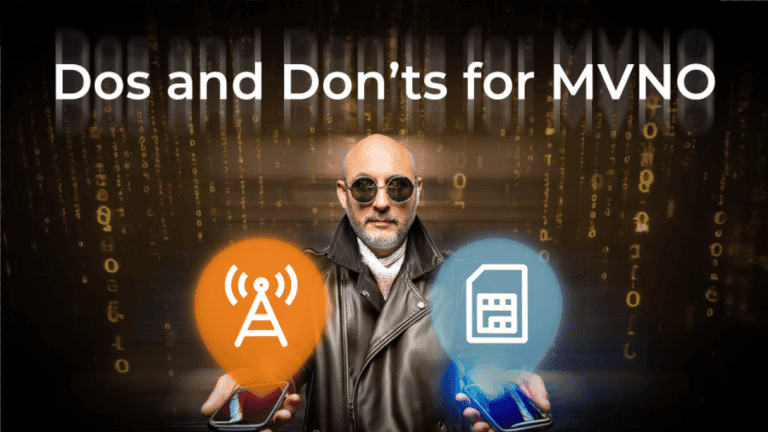If you’re considering launching a new MVNO, you will not want to miss this edition of our ongoing MVNO Academy series. Here, we invite Javier Pinzon, CEO of Virtual Communications, to share his deep experience in this sector so that you can learn what traps to look out for when negotiating your initial agreement with your MNO. You’ll see how the terms in your MNO agreement can define the parameters of your success going forward, and learn how to ensure your future profitability, maximize fraud management and cash flow management, and lock in the flexibility and freedom you’ll need to adapt and thrive.
Watch the full webinar recording below, or read on for a summary of the highlights. When you’re done, don’t forget to visit our MVNO Resource Hub and download your free copy of our “Negotiation Dos and Don’ts” checklist.

Webinar summary & highlights
This edition of the PortaOne MVNO Academy series kicked off with a brief overview of the MVNO business model, and a look at why it has become so important to the evolution of the telecom industry. After a welcome from Klaus Haertel, director of strategic alliances at PortaOne, special guest Javier Pinzon shared a bit of his own journey, describing his career transition from VoIP technologies to mobile communications.
“I have always been interested in how technology helps people – the people being even more important than the technology,” he says. “I think that the edge we have applied in different businesses… is just that: put a lot of empathy into creating something that really changes the user’s experience and the user’s life.”
Recognizing pitfalls and traps in the MVNO business
Javier and Klaus first dug into the “don’ts” side of the discussion, outlining four key areas where new MVNOs should pay close attention:
The exclusivity clause
In 2015, Javier’s company purchased an MVNO, only to discover too late that the MNO contract had an exclusivity clause, making it difficult to negotiate better terms or switch providers. That led to unfavorable pricing dynamics. “It was like a lion negotiating the prices with a zebra,” he said. “It was a very tough environment.” The clause was especially problematic when it came to transferring user SIM cards.
In order to balance out the harm from that exclusivity clause, Javier and other stakeholders worked with their local governments to create a more fair regulatory environment. That made it easier for MVNOs in Colombia to do business going forward.
Unfair pricing dynamics
The pricing structure in your contract is crucial, explained Javier. MVNOs should ensure that their agreement includes flexible pricing formulas to adapt to market changes. “This is the biggest learning I got from [that 2015 experience],” he said. “Carriers may see you as a milking cow because you have money to spend and you are attempting a new kind of business model.”
Fixed prices can quickly become uncompetitive as market rates drop, eroding profit margins. The way prices are negotiated and set in the contract is crucial. Market dynamics in telecommunications mean prices often decrease, so having a formula in the contract that allows for dynamic pricing adjustments is essential. If you agree to 0.06 per minute when the retail pricing is averaging 0.08, for example, you need to ensure that you can adjust to still be profitable if the retail pricing drops to 0.06 months later.
Fraudulent traffic management
Fraud is a significant issue in the MVNO space. Using examples from his past experience, such as phone modification that allowed YouTube traffic to be masked as DNS, Javier illustrated how innovative and unexpected fraud tactics can drastically impact an MVNOs costs and profitability. Fraud that was almost undetectable under his company’s original business model became extremely problematic when they switched to 4G – up to $200,000 a month, in fact. “Experience is a very good teacher, but it is very expensive,” said Javier with a laugh.
For that reason, it’s important to include provisions in your MNO contract to specify who is responsible for fraud costs and fraud management, and to manage and mitigate fraud risks. “Fraud will happen: it’s human nature,” he said. “People will always figure out how to get things for free.”
Cash flow management
The final “trap” that Javier identified is to neglect cash flow management, especially in the prepaid markets, or with gift cards. Understanding the regulatory landscape and ensuring your cash flow strategies align with these regulations can safeguard your business’s financial health. “You can be a cash machine if you are selling prepaid and selling postpaid to your carrier, but be very careful about cashflow,” says Javier. “It is the most critical thing after fraud and pricing.”
Strategies to safeguard your MVNO’s interests
Klaus then invited Javier to outline some of the strategies that MVNOs can employ both to safeguard against the traps he listed and to ensure profitability for years into the future. Here were his top tips:
Understand the regulations
Familiarize yourself with the regulatory environment in your country – and do it very well, because your success depends on it. Strong regulations can provide a foundation for fair agreements. If your country does not have regulations to protect wholesale markets, team up with your peers in the industry to lobby your local government to introduce them.
Ensure fair pricing formulas
“Make sure that your carrier sees you as a great business partner,” advised Javier. You are not a competitor to your MNO, you are a partner, a customer, and one of their best potential sources of revenue – and both your relationship and your agreement should reflect that. This will help you negotiate pricing formulas that reflect actual market dynamics and ensure that discounts are applied correctly.
Address fraud proactively
You know that fraud will happen, but you might never be able to predict the form. Discuss potential fraud scenarios with your MNO and agree on how you are going handle them – including the fraud methods that don’t exist yet. “If the MNO is giving you the platform, they should cover any misuse on it. But even if the platform is yours, the MNO will have some role in that,” said Javier. Implement technical solutions like DPI (Deep Packet Inspection) and real-time billing to monitor and manage known frauds.
And keep communication with your MNO open: “You can come to an agreement in terms of how you handle fraud, who will pay for it, who does and does not profit from it, and how you will close those gaps.”
Free checklist: “Negotiation Dos and Don’ts for MVNOs”
Our team prepared a downloadable summary of Javier’s insights, emphasizing its relevance to negotiation strategies in diverse global markets. If you would like your own copy of this valuable checklist, you can download it here.
Highlights from the interactive live Q&A
Q: How did you solve your former company’s issue with DNS traffic abuse?
A: “It was super hard because we had to restrict the amount of traffic on DNS, and that made customers very mad,” recalled Javier. He noted that his customers were buying modified cell phones from the retailer, and thought that free YouTube traffic was their right – they were not aware they were committing fraud. So, Javier’s company would receive complaints when the fraud was curtailed and customers realized their access was being restricted. “Back then, I wouldn’t say it was 100% solved, to be very honest,” he admits. All they could do was strive to educate their users as best they could about fair usage policies.
Q: Could you elaborate on the pros and cons of different pricing models when negotiating with MNOs?
A: When negotiating pricing models with Mobile Network Operators (MNOs), several factors come into play, said Javier. You either have a niche market where you really are different, and your customers are not sensitive to price – “You are providing more than just minutes or KBs, you are providing community,” he explained. Or, you have no niche, in which case your customer will be very sensitive to price. The second model is much more challenging, noted Javier – which means you really have to have a great contract to balance that challenge.
One successful approach for the second model involves bundling services with other products, like TV streaming with home telephony, or partnering with a popular major retail brand to offer or share points or added incentives from that partner. For example, an MVNO in France might be able to parter with a company like Carrefour to offer shopping points. Javier suggested prioritizing MNO partnerships over regulatory licenses, stressing the need for strong market positioning and strategic alliances to mitigate operational risks.
Q: Where should a new MVNO player start: negotiating with an MNO or securing a license from the regulator?
A: “It depends on the country, and on how hard it is to get the license, but in terms of strategy I will not even ask for a license if I don’t have a good MNO partner and good pricing structure and future vision,” answered Javier. Exceptions would be if you have a strong brand partnership (e.g., a retailer, a car brand, a bank or insurer, etc.), or some other significant or pre-established edge compared to the MNO.
Other exceptions arise when regulatory barriers necessitate upfront licensing, yet even then, initial engagement with potential MNO partners should remain strategic. Javier also recommended consulting with the MNO for fraud detection tools and leveraging technology partners like PortaOne for robust fraud prevention solutions.
Q: Can an MVNO have agreements with multiple MNOs simultaneously?
A: Yes, MVNOs can engage with multiple MNOs. Javier offered a few insights into the benefits of diversifying carrier partnerships to mitigate risks and enhance service offerings, noting that negotiating competitive pricing and service terms across different MNOs allows for leveraging market competition to secure favorable agreements.
If you would like to talk with our team about how PortaOne can be helpful in supporting your MVNO growth and helping to protect you from fraud, please get in touch. We are always happy to chat.


















